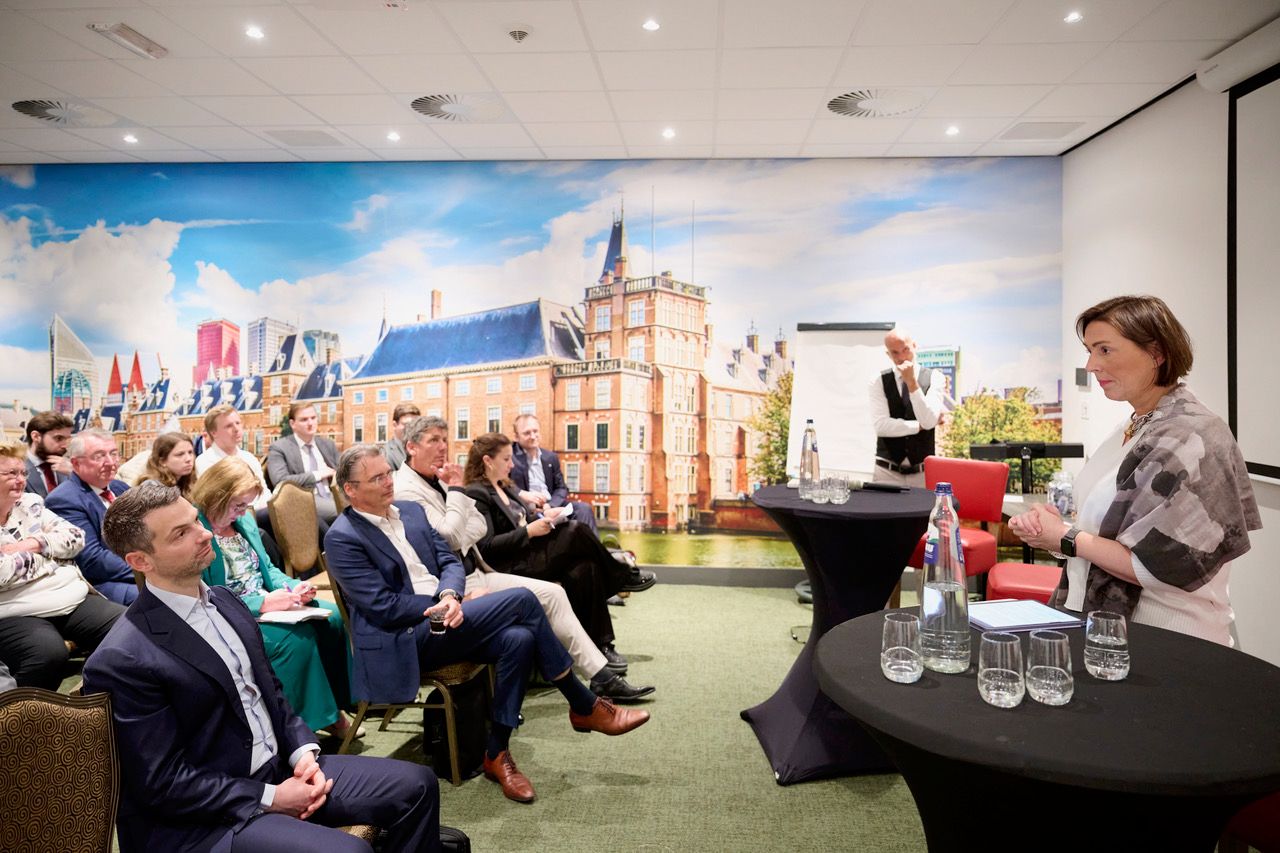
Malunky prync ve víkendové MF DNES
Přečtěte si článek o edici Malého prince v českých a moravských nářečí, za kterými stojí Martina Dlabajová. Vyšel ve víkendové příloze MF DNES - Magazín Víkend DNES.

SMEs are not only at the heart of European economy, but also contribute to shaping our unique European identity. When you imagine a typical European city, you can see streets full of small shops, cafes, restaurants, galleries or workshops, but as well small factories, workshops, services, consultancy companies... We may not realise it, but SMEs are a crucial part of our European culture. However, they have so much potential that is yet to be unlocked. How we do legislation in the EU: that is one of the main issues we need to focus on to release this large pool of potential.
Unfortunately, for a long time it seemed to me that the EU was more interested in putting an increasing amount of burden on businesses rather than helping them. During the last five years, and due to the many crises, that we have experienced, EU politicians and policymakers started to realise the need to build a globally competitive Europe. Most importantly, they woke up to the fact that businesses, and especially SMEs, play a central role in achieving European competitiveness, prosperity and security.
Supporting an SME friendly business environment in the EU was among my top priorities as a Member of the European Parliament. In this slowly ending mandate, I was the co-Chair of the SME Intergroup, which brought together MEPs from all parliamentary groups to discuss how to support SMEs at EU level. Within my political group Renew Europe, I also chaired the SME Taskforce, which I initiated. The taskforce connected liberal MEPs with stakeholders, representatives of the European Commission and other parties concerned with the support of SMEs.
Not an easy five years
Let me look back on the legislative term that is coming to an end - to remember the good and not-so-good times, what we have achieved in supporting SMEs, and where EU policymakers still have a lot of work to do.
It was certainly not an easy five years. It started with the Covid-19 crisis, which was soon followed by a war of aggression in Ukraine. Both crises hit SMEs very hard - many of them had to close their operations due to the pandemic restrictions and later on they had to suffer from increased energy prices and the associated economic depression.
When looking back, I have to say that the resilience and strength of European SMEs that we have seen in last few years is truly inspiring. So many SMEs were able to find new opportunities in times of crises and take advantage of the difficult situation they found themselves in. This further shows the incredible power of SMEs to quickly innovate and adapt to the current business climate. I am convinced that policymakers have a lot to learn from this amazing adaptability. And I must say that I am so proud of European SMEs.
I am also proud that thanks to the unprecedented support measures put together at the EU and national levels, the European economy was able to recover.
Most notably, SMEs were able to benefit from the temporary recovery instrument NextGenerationEU, launched already in 2020. It presented new funding initiatives such as the Recovery and Resilience Facility, InvestEU, or RepowerEU, which addressed the economic challenges of European businesses caused by the crises.

SMEs who are involved in research and innovation are also able to benefit from the Horizon Europe Framework Programme for Research and Innovation, which was launched in 2021. I had the pleasure to be involved in the negotiations as the shadow rapporteur for the file and I made sure SME participation is sufficiently monitored by the Commission.
What is important: All these funding programmes have not only ensured that SMEs have survived the economic crisis, but also continue to help them transition to greener and more digital business practices.
The biggest challenges remain
Despite these efforts, access to EU financing remains one of the biggest challenges for SMEs. Overly long and complicated application processes, high competition for funding and delays in the implementation of financing programmes make it difficult for SMEs to get the funding they deserve. For example, according to data from the European Commission from May 2023, SMEs represent only about a fifth of participation and of the EU’s contribution in Horizon Europe. Which is very sad.
To improve SME participation, EU policymakers need to further reduce the administrative burden for SMEs when applying for funding and address weaker national innovation systems.
The two big adjectives that in some ways defined the entire legislative term were Green and Digital.
The twin transition presented both an opportunity as well as a new challenge to European SMEs. On the one hand, it brought a big wave - some even call it a tsunami - of administrative burdens, for example when it comes to data protection or sustainability reporting. On the other hand, the adoption of new technologies and practices opens the door to new markets for businesses and increases their competitiveness.
Speaking about digitalisation, the European Parliament adopted an impressive number of files in the past mandate. I had the pleasure to be the rapporteur for the 2030 Path to Digital Decade Policy Programme. This programme, which was adopted in December 2022, sets concrete digital targets for the EU by the end of the decade, most notably that 90 % of SMEs reach at least a basic level of digitalisation.
On some of these targets, the EU has made good progress, such as on increasing the number of unicorns in the EU. Overall, however, much more effort is needed, especially when it comes to the adoption of digital technologies like AI, Big Data and Cloud by European businesses.
Among the major digital files relevant for SMEs are the Digital Services Act and the Digital Markets Act, which aim to establish a level playing field for businesses on the digital market. Other files include the Data Act, the Cybersecurity Actor the AI Act, just to name a few of them.
All this new legislation allows European businesses to operate with legal certainty and under clearly defined rules that protect them from unfair practices and threats such as cyberattacks.
How to catch up with global competitors
Many of these legislative files also include special provisions for SMEs. We will see in the coming years how this new legislation will help our businesses catch up with their global competitors. Some argue that this will slow down innovation due to various rules and restrictions. In my opinion, if we want to achieve real progress and innovation, it is crucial to legislate when there is a legal vacuum, but also to let businesses operate freely and leave it to market competition as much as possible.
When it comes to the green transition, the past mandate has been exceptionally eventful. In June 2021, the European Parliament adopted legally binding targets for the EU of reducing emissions by 55 % by 2030 and achieving climate neutrality by 2050. It was a major step towards a more sustainable future, and it brought many responsibilities for SMEs. That is why the EU established the Just Transition Fund to offer investment for SMEs and the Social Climate Fund to support the most vulnerable businesses in the transition.
Some of the key files were adopted to strengthen European manufacturing of clean technologies - the Net Zero Industry Act and the Critical Raw Materials Act. The revision of the Energy Efficiency Directive or the Nature Restoration Law also played a key role.
A very controversial file was the Corporate Sustainability Due Diligence Directive. It was adopted during the last plenary session in April of this year. After intense negotiations, we managed to exclude SMEs from the scope of the proposal, which sets out a legal liability for environmental and human rights violations within the supply chain of European companies. Unfortunately, SMEs will still be affected by the directive through their supply chains, leading to further administrative burden.

Now, let us continue our little journey through time to the more recent developments which I consider essential. In September 2023, the European Commission presented the long-awaited SME Relief Package. The European Parliament was involved in the preparations of this package, most notably through the Resolution on the State of the SME Union, which was adopted in July last year.
The package includes measures to reduce the legislative burden on SMEs, ensure better rules on late payments in commercial transactions, or offer support in the transfer of businesses to new owners. Some of the proposals, such as the Head Office Tax system for SMEs, which simplifies tax matters in cross-border business, the Listing Act, which will make public capital markets more attractive for SMEs, and the Late Payment Regulation, have already been adopted by the European Parliament.
Other proposals forming the SME Relief Package, like the planned reduction of reporting requirements by 25 % or the Skills and Talent Mobility Package, are unfortunately still being processed and will likely continue far into the next mandate.
Let me stop here. I believe we have achieved a lot in this mandate in supporting SMEs at EU level. But it is still not enough… It doesn’t end there. The two key words are now: implementation and enforcement. In addition, full harmonisation is also necessary to prevent so-called gold plating in Member States.
What I see as the biggest shift – the major improvement – compared to the last mandate, is a change of thinking and approach.
What caused this change of mentality? Policymakers have begun to realize the huge impact of the regulatory burden on SMEs and, more generally, the key importance of SMEs to Europe’s competitiveness. And it is also thanks to the fact that the stakeholders talk to them, approach, explain and describe what is bothering them at every possible opportunity.
Matter of survival
We need to continue this trend and ensure that SMEs have a stable and strong position in EU policymaking. For many SMEs, this may very well be a matter of survival. The facts are clear here: According to the 2023 Annual Report on European SMEs, EU businesses were still unable to reach pre-crisis levels of added value (2019) and are unlikely to do so in the anytime soon. This shows that radical action is needed.
To me the four most pressing issues are the following:
Lack of skills - We need to focus on ways to support reskilling and upskilling of the workers we have, as well as attracting talent from abroad. EU policy makers should look for ways to support vocational training and better link the business and education sectors to ensure that education and the specific needs of the job market are matched.
Regulatory burden - To ensure SMEs are not drowned out by new legislation, the impact on SMEs needs to be taken into account from the beginning when new legislation is drafted. This means reforming the current application of the SME Test. Cumulative and indirect impacts on businesses also need be assessed.
Access to finance - We need to make funding programmes, such as Horizon Europe, InvestEU, the European Regional Development Fund and the Cohesion Fund, more SME friendly.
Barriers to the Single Market – Most notably, overly complex and lengthy processes for cross-border trade and movement of services, differences in national rules for services and products, and discriminatory practices in cross-border public procurement. All these obstacles represent a major roadblock for the EU’s economy.
These are some of the long-term systemic issues that SMEs have been struggling with for years. Fighting them will remain a challenge for the future, but I personally believe that step by step the EU can find effective solutions. There are already some initiatives.
Last year at the SME Assembly in Bilbao, the Renew Europe delegation, which I had the pleasure to chair, presented the call for an SME Empowerment package. Our proposals ranged from investments earmarked for SMEs to a legislative proposal on e-invoicing, as well as a Europe-wide business transfer barometer and a more widespread use of transition periods for new, burdensome pieces of legislation. We also call for a European definition for owner-led companies and mid-caps and the creation of an EU Funds Portal to better inform companies of available funding. I hope that the next Commission will look into our proposals and take them into consideration.
Forefront of interests
The future will not be easy. However, I am convinced that in the last five years we have done a lot for SMEs. I am leaving the European Parliament with calm mind because I know that SMEs are no longer just talked about in empty speeches, but something is also being done for them. Not everything has to be successful immediately, problems and challenges persist and will persist, but the important thing is that SMEs have come to the forefront of interests and have become a real topic. It makes me satisfied.
I believe that for Europe to remain competitive, it is essential to explore strategies to boost the competitiveness of SMEs. By providing these companies with the right business environment and the right support, I am sure that we can set the stage for EU's prosperity.
The competitiveness of Europe depends on the competitiveness of its SMEs. They are Europe’s strength, its culture, its future… They inspire us every day with their strong ambitions, innovative thinking and incredible courage.
Let us not forget this, and more importantly, let us make sure European politicians do not forget this. Let us together turn Europe into a real SME superpower!
Projev europoslankyně Martiny Dlabajové, který zazněl 15. 5. 2024 na Business Europe’s SME Roadshow. Third stop The Hague. How to turn Europe into an SME Superpower v nizozemském Haagu.